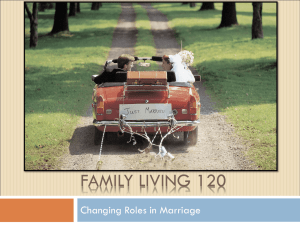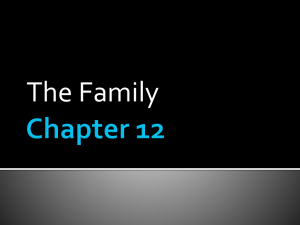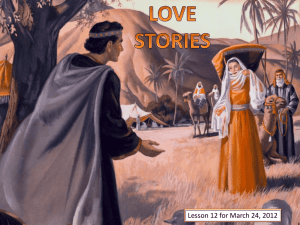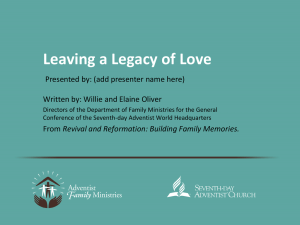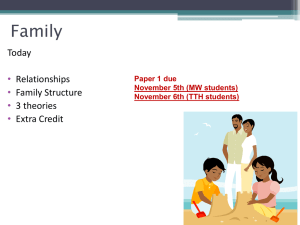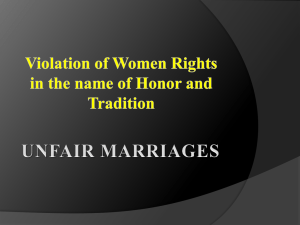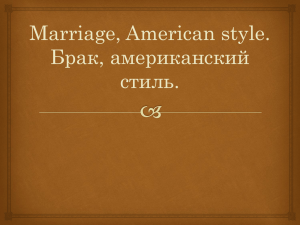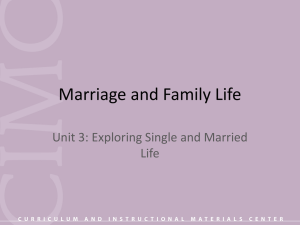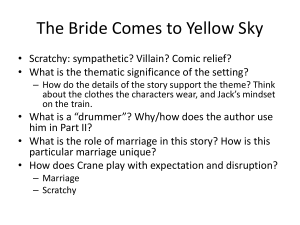The Social Institution of Marriage
advertisement
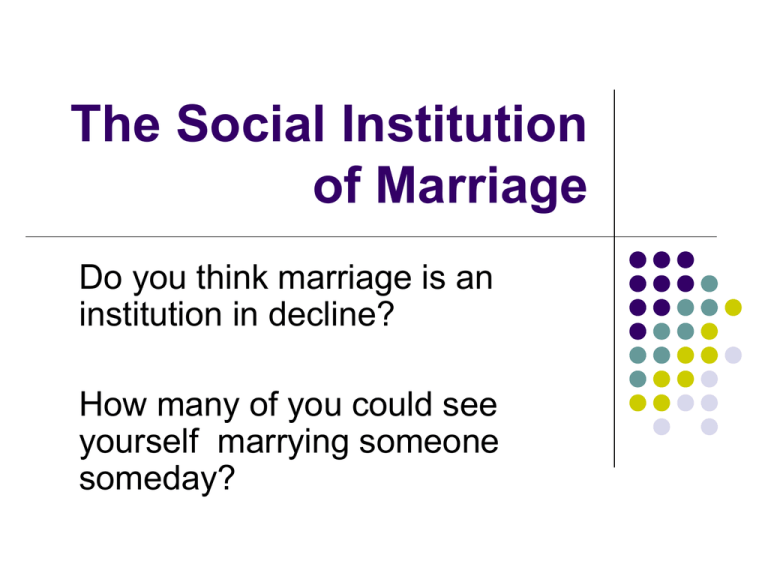
The Social Institution of Marriage Do you think marriage is an institution in decline? How many of you could see yourself marrying someone someday? About Marriage (2) A little boy asked his father, "Daddy, how much does it cost to get married?" And the father replied, "I don't know son, I'm still paying." Young Son: Is it true, Dad, I heard that in some parts of Africa a man doesn't know his wife until he marries her? Dad: That happens in every country, son. A woman was telling her friend, "It is I who made my husband a millionaire." "And what was he before you married him?" asked the friend. The woman replied, "A billionaire." Marriage is the triumph of imagination over intelligence. Second marriage is the triumph of hope over experience. Eighty percent of married men cheat in America. The rest cheat in Europe. The most effective way to remember your wife's birthday is to forget it once. First guy (proudly): "My wife's an angel!” Second guy: "You're lucky, mine's still alive." A declining social institution? No, still a strong institution Most adults over 25 marry About 1/3 of first marriages dissolve Divorce rates peaked in 1987 and have been declining since Remarriage rates are high (35%) A Changing Institution 1800s – marriage governed by economic factors. Love not as important. Pre 1920s – courtships monitored by family and community. Chaperons Dating became more Today – different types of marriage (common law unions, same-sex marriages) Mainstream Canadian Marriage Structures (patterns of functioning) Free-choice marriage: marriage that results from two partners seeking and developing their relationships on their own, without the intervention of a third party (e.g. family). Most often people date several people to find a “true love” or “romantic love” Romantic Love: choosing a partner based on shared values/goals, compatible personalities and physical attraction. What is Romantic Love? Contrast with Platonic Love sexual nature intermixed with ‘liking’ Care / concern / affection Phenylethylamine addictive effects ‘wear off’… chocolate then what? Theorists: Triangular Theory of Love (Sternberg): love consists of three parts: 1. passion 2. intimacy (feeling of closeness) and 3. commitment (decision commit to maintaining love) John Lee: People have a psychological craving for love, especially in our urbanized and alienating/individualistic society. People want relationships to end loneliness and support who they are. Says opposites don’t attract because… Criticisms of Free-choice marriage based on romantic love Love can blind you to your future partner’s faults Relationships may dissolve when passion declines Some argue that family and friends should have input in selecting a partner because their viewpoint is more neutral (objective) Questions: What are the pros and cons of marriage in Canada? Is romantic love a sound basis for developing a life long relationship? How are people socialized to want romantic love? Do we really need lifelong marriages? Do you think some Canadians marry for reasons other than love? E.g. Do some people see themselves as likeable or valuable only if another person makes a lifelong commitment to them? Argumentative Piece Write a short piece based on yesterday’s discussion. Question: Prisons are effective in rehabilitating criminals. Develop a Thesis- Answer the above question with yes or no. Using the textbook and your notes to develop three separate points. Then create a paragraph for each point. You do not need an introduction or conclusion. In total you should have three paragraphs. Due: Monday
